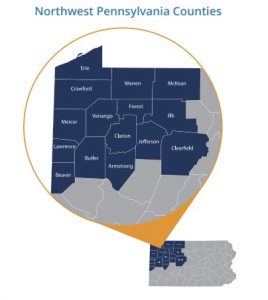What is a Personal Safety Plan?
 The Northwest Pennsylvania (NW PA) Veteran Suicide Prevention Program operates on a three-pronged approach involving healthcare providers, community organizations, and Veterans and their families. A Personal Safety Plan is a tool that can be used by anyone to empower Veterans by helping them prepare for steps that can help avert a behavioral health crisis or suicidal thoughts. Through a series of discussions, a trusted caregiver, family member, or friend can help a Veteran create a plan that best meets their personal needs.
The Northwest Pennsylvania (NW PA) Veteran Suicide Prevention Program operates on a three-pronged approach involving healthcare providers, community organizations, and Veterans and their families. A Personal Safety Plan is a tool that can be used by anyone to empower Veterans by helping them prepare for steps that can help avert a behavioral health crisis or suicidal thoughts. Through a series of discussions, a trusted caregiver, family member, or friend can help a Veteran create a plan that best meets their personal needs.
Please reach out to us if you have any questions or would like to speak with someone about publicizing the NW PA Veteran Suicide Prevention Program in your community.
Read time: 4 minutes
Why Personal Safety Plans Save Lives
 A Personal Safety Plan is more than a piece of paper. It is an agreed-upon strategy indicating how family members or loved ones should respond in a crisis. Time must be dedicated to regularly reviewing and practicing the safety strategies in the plan. Veterans have a high degree of familiarity with firearms and are more likely than members of the U.S. general population to have access to firearms. Reducing access to lethal means such as firearms and medications builds time and space between the impulse to act and the means to harm oneself. By collaborating with Veterans ahead of time, we can help them survive a suicidal crisis.
A Personal Safety Plan is more than a piece of paper. It is an agreed-upon strategy indicating how family members or loved ones should respond in a crisis. Time must be dedicated to regularly reviewing and practicing the safety strategies in the plan. Veterans have a high degree of familiarity with firearms and are more likely than members of the U.S. general population to have access to firearms. Reducing access to lethal means such as firearms and medications builds time and space between the impulse to act and the means to harm oneself. By collaborating with Veterans ahead of time, we can help them survive a suicidal crisis.
Reducing Risk for Firearm Suicide
 Everyone has a role to play in promoting lethal means safety. Health care and social service providers are in a unique position to educate Veterans and their loved ones about the importance of safe storage options. Firearm owners, dealers, shooting clubs, hunting organizations, and others can also help promote firearm safety and increase involvement in suicide prevention. Some ideas to incorporate into a Personal Safety Plan include:
Everyone has a role to play in promoting lethal means safety. Health care and social service providers are in a unique position to educate Veterans and their loved ones about the importance of safe storage options. Firearm owners, dealers, shooting clubs, hunting organizations, and others can also help promote firearm safety and increase involvement in suicide prevention. Some ideas to incorporate into a Personal Safety Plan include:
- Temporary off-site storage options include family members, friends, police departments, gun shops, or shooting clubs.
- Safe storage options in the home —preferably while giving a key or safe combination to a loved one —include a cable lock, trigger lock, lock box, or gun safe.
- Even storing ammunition separately from guns reduces suicide risk.
Reducing Risk from Lethal Medications
 During periods of suicide risk, options for preventing intentional or unintentional overdose from medications or illicit drugs include:
During periods of suicide risk, options for preventing intentional or unintentional overdose from medications or illicit drugs include:
- Having a family member or friend administer medication in the correct dosage.
- Asking a doctor or pharmacist to limit the number of refills or pills prescribed.
- Portioning pills for a few days and locking the rest away or giving them to a trusted family member or friend.
- Disposing of unused medication at a pharmacy or using safe at-home disposal kits.
- Having naloxone (e.g., Narcan) available to rapidly reverse an opioid overdose.
Personal Safety Plans: A conversation that can save a life.
 All too often, starting the conversation about a Personal Safety Plan is the hardest step. However, it’s a necessary step that can save a life. Here are some suggestions for getting started:
All too often, starting the conversation about a Personal Safety Plan is the hardest step. However, it’s a necessary step that can save a life. Here are some suggestions for getting started:
- “How do you currently store your firearms/medications?”
- “What concerns do you have about storing them more safely?”
- “Who could hold the key to your gun lock/set the combination to your gun safe for a while until this rough part is over?”
- “How can you help keep yourself safe from substances when you’re in a crisis (e.g., by removing alcohol from the home)?”
- “Who can help support you during a difficult time? Are you interested in talking to someone else about this (e.g., discussing lethal means safety and other clinical resources with a peer)?”
If the Veteran doesn’t want to take steps toward safe storage now:
- “How will we know when it’s time to take extra steps or do something differently?”
- “Let’s make a plan for following up on this.”
- “Can you think of anything else you could do to increase your safety during this tough time?”
Another suggestion is to complete a Personal Safety Plan for yourself and then ask a friend or family member if they will be one of your contacts if you need a friend to talk to. Then, offer to be one of their contacts by encouraging them to complete a plan of their own. This humble approach helps reduce stigma and underscores that everyone can benefit from a Personal Safety Plan before they experience a crisis.
Printable Personal Safety Plans are available through our partner, Hold My Guns and SuicideSafetyPlan.com
Looking to Get Involved?
 Whether you identify as a healthcare provider, community organization, or Veteran, there are several opportunities through the NW PA Veteran Suicide Prevention Program and PERU to connect to resources, participate in educational training, and promote harm reduction strategies. We are actively recruiting healthcare and community partners to work with us in meeting our goals and objectives. To learn more, visit the program website at theresilientveteran.org.
Whether you identify as a healthcare provider, community organization, or Veteran, there are several opportunities through the NW PA Veteran Suicide Prevention Program and PERU to connect to resources, participate in educational training, and promote harm reduction strategies. We are actively recruiting healthcare and community partners to work with us in meeting our goals and objectives. To learn more, visit the program website at theresilientveteran.org.
Need Help? Know Someone Who Does? Contact the National Suicide Prevention Lifeline at 988 or use the online Lifeline Crisis Chat. Both are free and confidential. You’ll be connected to a skilled, trained counselor in your area.

